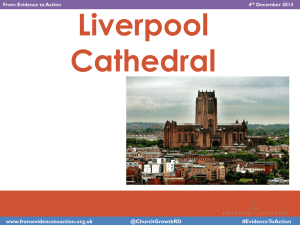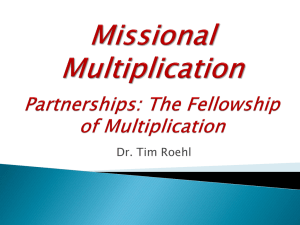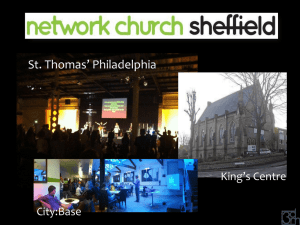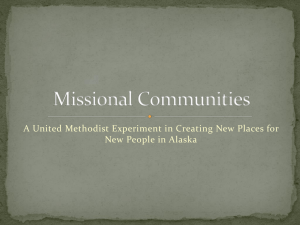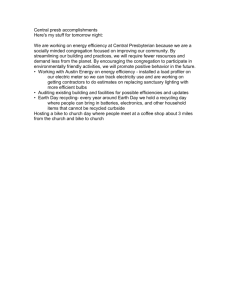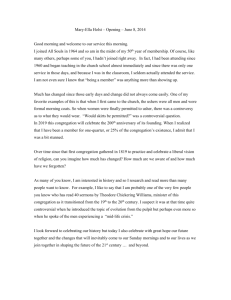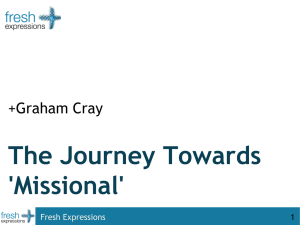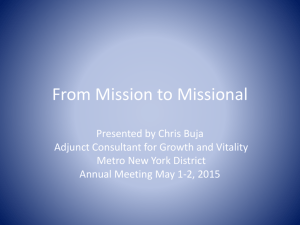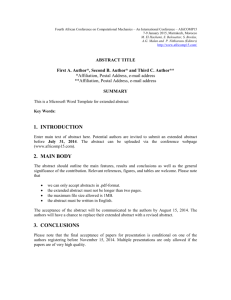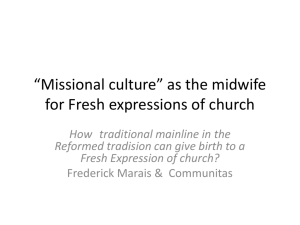introducing_the_missional_church_
advertisement
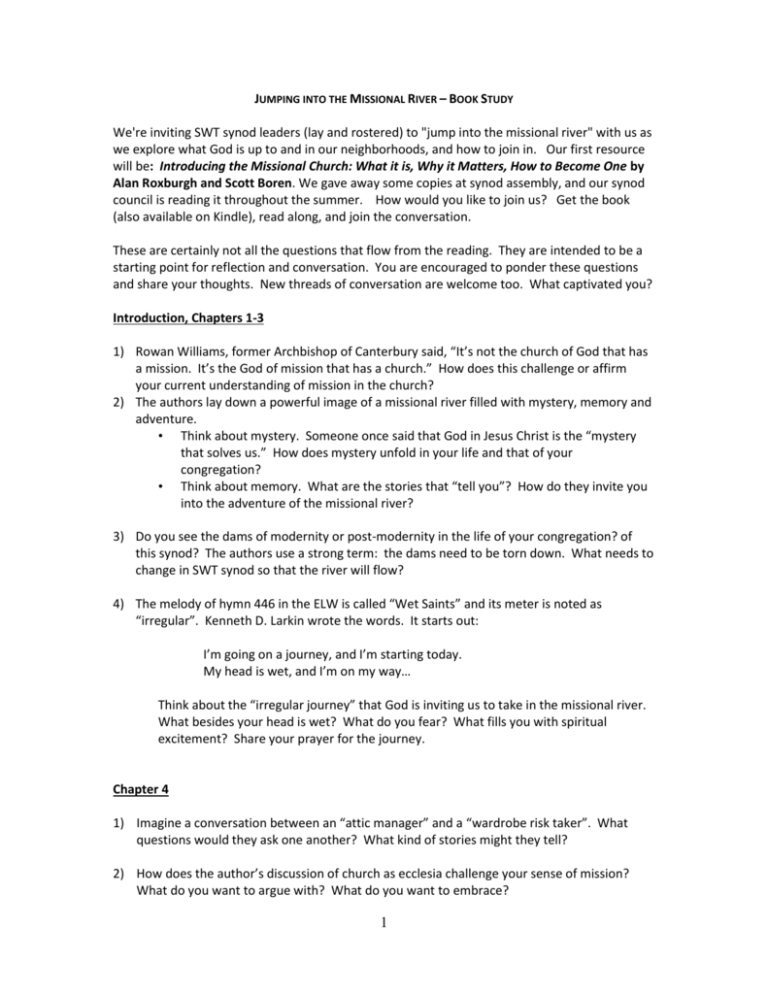
JUMPING INTO THE MISSIONAL RIVER – BOOK STUDY We're inviting SWT synod leaders (lay and rostered) to "jump into the missional river" with us as we explore what God is up to and in our neighborhoods, and how to join in. Our first resource will be: Introducing the Missional Church: What it is, Why it Matters, How to Become One by Alan Roxburgh and Scott Boren. We gave away some copies at synod assembly, and our synod council is reading it throughout the summer. How would you like to join us? Get the book (also available on Kindle), read along, and join the conversation. These are certainly not all the questions that flow from the reading. They are intended to be a starting point for reflection and conversation. You are encouraged to ponder these questions and share your thoughts. New threads of conversation are welcome too. What captivated you? Introduction, Chapters 1-3 1) Rowan Williams, former Archbishop of Canterbury said, “It’s not the church of God that has a mission. It’s the God of mission that has a church.” How does this challenge or affirm your current understanding of mission in the church? 2) The authors lay down a powerful image of a missional river filled with mystery, memory and adventure. • Think about mystery. Someone once said that God in Jesus Christ is the “mystery that solves us.” How does mystery unfold in your life and that of your congregation? • Think about memory. What are the stories that “tell you”? How do they invite you into the adventure of the missional river? 3) Do you see the dams of modernity or post-modernity in the life of your congregation? of this synod? The authors use a strong term: the dams need to be torn down. What needs to change in SWT synod so that the river will flow? 4) The melody of hymn 446 in the ELW is called “Wet Saints” and its meter is noted as “irregular”. Kenneth D. Larkin wrote the words. It starts out: I’m going on a journey, and I’m starting today. My head is wet, and I’m on my way… Think about the “irregular journey” that God is inviting us to take in the missional river. What besides your head is wet? What do you fear? What fills you with spiritual excitement? Share your prayer for the journey. Chapter 4 1) Imagine a conversation between an “attic manager” and a “wardrobe risk taker”. What questions would they ask one another? What kind of stories might they tell? 2) How does the author’s discussion of church as ecclesia challenge your sense of mission? What do you want to argue with? What do you want to embrace? 1 3) Thinking of your own context, where do you want to begin a “conversation” between the Gospel and your Context? What risky steps are you ready to try? 4) Choose a hymn in the ELW index under the title “community in Christ” (pg. 1179-80). Comment on how that hymn expresses an understanding of church and mission. Chapter 5 1) Roxburgh and Boren say it’s dangerous for the church to give people what they want? How does that conversation resonate with you? 2) The authors contrast space spirituality with place spirituality. On a scale of 1 to 5 (1 being least and 5 being most), how does your congregation reflect place spirituality? What are some signs of this? 3) What is one way you will commit to enter into and listen to the culture outside of your congregation in the next week? 4) After you have entered and listened, what new insights did you gain from your reading of (any) passage of scripture? Do any of these insights send you back to the neighborhood in a new way? How? Chapter 6 1) The authors present 3 types of contextual theology using labels identified by Robert Schrieter (pg 92). Which kind of a theologian are you? What are the signs that tell you so? What area of theology do you want to work on to “up your game”? Why? 2) Jesus “moved into the neighborhood.” (pg 94) Roxburgh uses an extended cooking metaphor to open up this idea for us. Do you have other metaphors from daily life that help to understand the idea of Jesus moving into the neighborhood? 3) (Pg 97) The authors say the disciples understood themselves as sent to “gossip” and communicate the Good News of Jesus in the midst of the neighborhoods and communities. What might change if our sermons were called “community gossip”? Or what if we told our congregations at the end of worship to “go in peace and gossip?” 4) How does Paul’s answer to the purveyors of mystery religion in his day, resonate with our call to share good news in today’s communities and contexts? Chapter 7 2 1) The authors talk about sign, witness and foretaste. Right now, what kind of a sign are you? To what do you point? If you were a sample taste in Costco or Sam’s Club would people want to purchase a big package? You might want to ask several church folk how they are a sign. To what do they point? Compile your answers and try to understand what the results might mean. 2) What would be the characteristics of your congregation if it was a contrast society in your neighborhood context? 3) Reflect on the practices of God’s presence, of love and of neighborhood engagement. Where do you feel called to start an experiment? What might that look like? Chapters 8-10 1) The authors tell the story of Moses in Exodus 33 pleading with God to come with the newly liberated slaves on their journey. “If you are not present, how will we know what you think, and how will we know who we are?” Reflect on how we have listened, or not listened to God. Do we know what God thinks? Do we know who we are? 2) From Chapter 9, pg 123: “Where is your here? What is happening among your people in the places where they live and work right now? What are the stories shaping them at this moment in time?” From where is your congregation starting its missional journey? 3) You might want to try the experiment in the side bar on page 127 with a group of leaders. If you do, describe some of the outcomes. If you don’t, why did you decide not to give it a go? 4) The process described from pg. 140-146 seems to be more chaotic than linear, more intuitive than rational. How do you feel as you read about this process? What would you need to have in place in order to give it a try? Chapters 11-13 1) There are 4 questions on page 152. Ask yourself these questions. Find 2 or 3 other people in your congregation and ask them the same questions. Of what are you becoming aware? Are there images or metaphors that come up? Where is God in these responses? 2) Awareness is more of a personal or individual experience. Understanding is when the faith community begins to share their own stories and find a meta narrative that helps them understand who they are in the clearing space that is opening up. The question in the subtitle on page 157 is a good one for your faith community. Can you really talk about these thing? Why or why not? 3) Freed from the need to “get it right” people are free to experience how the Spirit is working and what is being called forth. How does the illustration of the tree and its network of roots help you rest in the Spirit instead of rushing forward with answers and solutions? 3 Chapter 14-Conclusion 1) The authors claim that generally the Church Council or Board is to provide spiritual oversight, discerning the purposes and direction of God for the community of believers. They say that the Council is called to listen to the Spirit. How closely does this reflect your experience of Church Council? How will experiment language help leaders claim and fully live into this call? 2) On page 193, the author write about “missional engagement.” How does this motivate you or make you reluctant to step out? Explain. 3) Watch the YouTube video described at the end of the conclusion. Content aside, what do you think, feel about “listening” to the neighborhood? www.kcet.org/shows/socal_connected/content/econom/is-anybody-listening.html What are you looking forward to? What gives you pause? 4
